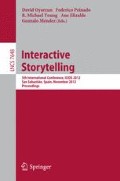Abstract
Little research in Interactive Digital Storytelling (IDS) has been given to writing stories that convey a set of Learning Objectives (LOs). This is particularly important for educational IDS games. In this paper we propose the STAR framework for formalizing the design of IDS stories for educational interventions. The story is designed as a set of red-herrings and clue puzzle in which the LOs are integrated. We present one of the three IDSes we designed based on this framework; we use one as a case study and present its evaluation. A study was undertaken to evaluate the game effectiveness in conveying the educational message. This study performed with 145 players shows that the players’ knowledge improved as a result of playing the game and that the change was statistically significant.
Access this chapter
Tax calculation will be finalised at checkout
Purchases are for personal use only
Preview
Unable to display preview. Download preview PDF.
References
Hodhod, R., Cairns, P., Kudenko, D.: Innovative Integrated Architecture for Educational Games: Challenges and Merits. In: Pan, Z., Cheok, A.D., Müller, W., Yang, X. (eds.) Transactions on Edutainment V. LNCS, vol. 6530, pp. 1–34. Springer, Heidelberg (2011)
O’Neil, H.F., Perez, R.S.: Computer Games and Team and Individual Learning. Elsevier, Amsterdam (2008)
Bergström, K.: Framing Storytelling with Games. In: Si, M., Thue, D., André, E., Lester, J.C., Tanenbaum, J., Zammitto, V. (eds.) ICIDS 2011. LNCS, vol. 7069, pp. 170–181. Springer, Heidelberg (2011)
Smith, G., Anderson, R., Kopleck, B., Lindblad, Z., Scott, L., Wardell, A., Whitehead, J., Mateas, M.: Situating Quests: Design Patterns for Quest and Level Design in Role-Playing Games. In: Si, M., Thue, D., André, E., Lester, J.C., Tanenbaum, J., Zammitto, V. (eds.) ICIDS 2011. LNCS, vol. 7069, pp. 326–329. Springer, Heidelberg (2011)
Szilas, N., Axelrad, M., Richle, U.: Propositions for Innovative Forms of Digital Interactive Storytelling Based on Narrative Theories and Practices. In: Pan, Z., Cheok, A.D., Müller, W., Chang, M., Zhang, M. (eds.) Transactions on Edutainment VII. LNCS, vol. 7145, pp. 161–179. Springer, Heidelberg (2012)
Murray, J.H.: Why Paris Needs Hector and Lancelot Needs Mordred: Using Traditional Narrative Roles and Functions for Dramatic Compression in Interactive Narrative. In: Si, M., Thue, D., André, E., Lester, J.C., Tanenbaum, J., Zammitto, V. (eds.) ICIDS 2011. LNCS, vol. 7069, pp. 13–24. Springer, Heidelberg (2011)
Spires, H.A., Rowe, J., Mott, B., Lester, J.: Problem Solving and Game-Based Learning: Effects of Middle Grade Students’ Hypothesis Testing Strategies on Learning Outcomes. Journal of Educational Computing Research 44(4), 453–472 (2011)
Mehta, M., Corradini, A., Ontañón, S., Henrichsen, P.J.: Textual vs. Graphical Interaction in an Interactive Fiction Game. In: Aylett, R., Lim, M.Y., Louchart, S., Petta, P., Riedl, M. (eds.) ICIDS 2010. LNCS, vol. 6432, pp. 228–231. Springer, Heidelberg (2010)
Adams, D.M., Mayer, R.E., MacNamara, A., Koenig, A., Wainess, R.: Narrative Games for Learning: Testing the Discovery and Narrative Hypotheses. J. of Educational Psychology 104(1), 235–249 (2012)
Wolfe, M.B.W., Mienko, J.A.: Learning and Memory of Factual Content from Narrative and Expository Text. British Journal of Educational Psychology 77, 541–564 (2007)
Savery, J.R., Duffy, T.M.: Problem Based Learning: An Instructional Model and its Constructivist Framework. Educational Technology 35, 31–38 (1995)
Sancho, P., Moreno-Ger, P., Fuentes-Fernández, R., Fernández-Manjón, B.: Adaptive Role Playing Games: An Immersive Approach for Problem Based Learning. Educational Technology & Society 12(4), 110–124 (2009)
Cheng, Y.-M., Kuo, S.-H., Lou, S.-J., Shih, R.-C.: The Construction of an Online Competitive Game-Based Learning System for Junior High School Students. The Turkish Online Journal of Educational Technology 11(2) (2012)
Barrows, H.S., Tamblyn, R.M.: Problem-based Learning: An approach to Medical Education. Springer, New York (1980)
Farrell, D., Kostkova, P., Lecky, D., McNulty, C.: Teaching Children Hygiene Using Problem Based Learning: The Story Telling Approach to Games Based Learning. In: International Conference on Web-based Learning Second Workshop on Story-Telling and Educational Games (2009)
Mayer, R.E.: Applying the science of learning. Pearson, Upper Saddle River (2010)
Lecky, D.M., McNulty, C.A.M., et al.: What are School Children in Europe being Taught about Hygiene and Antibiotic Use? J. Antimicrob. Chemother 66(suppl. 5), 13–21 (2011)
Kostkova, P.: Seamless Evaluation of Interactive Digital Storytelling Games: Edugames4All. In: Kostkova, P., Szomszor, M., Fowler, D. (eds.) eHealth 2011. LNICST, vol. 91, pp. 80–84. Springer, Heidelberg (2012)
Snow, B.: Why most People don’t Finish Video Games, http://articles.cnn.com/2011-08-17/tech/finishing.videogames.snow_1_red-dead-redemption-entertainment-software-association-avid-gamers?_s=PM:TECH
Schoenau-Fog, H.: Hooked! – Evaluating Engagement as Continuation Desire in Interactive Narratives. In: Si, M., Thue, D., André, E., Lester, J.C., Tanenbaum, J., Zammitto, V. (eds.) ICIDS 2011. LNCS, vol. 7069, pp. 219–230. Springer, Heidelberg (2011)
Author information
Authors and Affiliations
Editor information
Editors and Affiliations
Rights and permissions
Copyright information
© 2012 Springer-Verlag Berlin Heidelberg
About this paper
Cite this paper
Molnar, A., Farrell, D., Kostova, P. (2012). Who Poisoned Hugh? - The STAR Framework: Integrating Learning Objectives with Storytelling. In: Oyarzun, D., Peinado, F., Young, R.M., Elizalde, A., Méndez, G. (eds) Interactive Storytelling. ICIDS 2012. Lecture Notes in Computer Science, vol 7648. Springer, Berlin, Heidelberg. https://doi.org/10.1007/978-3-642-34851-8_6
Download citation
DOI: https://doi.org/10.1007/978-3-642-34851-8_6
Publisher Name: Springer, Berlin, Heidelberg
Print ISBN: 978-3-642-34850-1
Online ISBN: 978-3-642-34851-8
eBook Packages: Computer ScienceComputer Science (R0)

